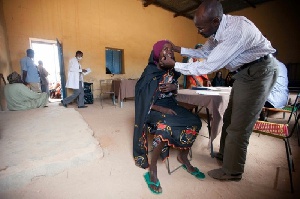Physician assistants (PA’s) are needed in villages and suburbs across Ghana to supplement Ghana’s shrinking workforce of physicians as primary care providers.
Research by the 2013 Annual Survey of the American Academy of Physician Assistants has proved that about 12% of physician assistants are working in rural settings to provide primary health care to the people who cannot afford it.
Primary health care is made the first level of contact of individuals and families with the national health system bringing health care as close as possible to where people live and work.
Primary care constitutes the first element of a continuing health care process that may also include the provision of timely and appropriate secondary and tertiary levels of care. Primary health care is averagely covered in cities as compared to those in the villages, who solely rely on the help of the herbalist. Rural areas benefit immensely from the work of PAs.
Some of the work of Pas are to serve as the care providers for patients with chronic conditions, provide care that is cost-effective and safe, increase access to care, a wider scope of practice and less access to physician supervision than urban PAs.
Rural physician assistants are usually the healthcare provider for patients with chronic conditions. Most chronic disease such as tuberculosis, leprosy, dracunculiasis and liver cancers (due to the toxicity of the herbal medicines) which are present among the subjects in rural areas such as Otabil, Abura, Nkafoa, Paga, Nzulezu, Tepa and Buabeng Fiema.
Rural PAs are required in their professional skills to be approachable and have good communication with their clients. In doing so, they show attentive care and go beyond to the extent of being more considerate and selfless as they live among the inhabitants. Rural PAs normally know almost all the information (age, household, work and status) about the people in the community, when they establish good physician assistant- patient relationship.
This brings about the community involvement. Participation of physician assistants in the community outside of the medical arena built a stronger relationship between provider and residents and developed more trust and confidence on both sides.
Physician assistants who resided in the town in which they practised displayed more commitment to the community in social and civic standpoint, as opposed to just a professional relationship alone. In addition to community involvement, attitudes toward physician assistants who remained in the area for longer periods of time increased the community satisfaction of these healthcare providers. Rural PAs that remained in the community for longer periods of time conveyed an interest in the community, as well as built confidence among patients.
The cost of healthcare is a major component that influences individual’s decisions on health care from providers, to procedures, medications, treatments, and ultimately access. Rural physician assistants provide care that is cost effective and safe. This means that healthcare becomes cheap as government and other NGOs are accountable to expenses of health services given to the residents in the rural settings.
One of the principles of primary health care is government accountability. However, government may not be able to cover all the expenses, so health care is charged less than those in the urban centres. Many rural clinics are set up to address the daily health care needs of patients without insurance and those who do not qualify for Medicare or Medicaid. Others are designed to divert patients away from already overpopulated emergency rooms in hospitals.
Rural PAs are mostly well paid when they do extremely well in promoting primary health care to the natives. It is safe in the awareness that, the people are educated on the medications they are given based on their side effect and adverse effect (when overdose) in contrast to some herbal medicines which has no scientific basis.
Thirdly, rural inhabitants have easy access to healthcare when PAs are living among them and become part of the community. Health care access is the ability to obtain preventative, routine, and acute health care in a timely fashion.
Access to health care can be broken down into three main categories: availability, accessibility and affordability. The inhabitants in the community freely approach them whenever their health is in crisis. They do not have to go on long distance in another community or the cities for quality healthcare. Primary health care is quality oriented.
Physician assistants being part of Community-Based Health Planning and Services (CHPS) has impressively helped in promoting primary care which provides all the element of primary health care including health education, maternal, child healthcare and family planning, prevention of endemic diseases, immunizations, treatment of communicable and non- communicable diseases, nutrition, drug availability and sanitation.
These elements are made universally accessible to everybody especially to those who lack health facilities. Increasing healthcare access in these deprived areas (rural) is linked to increasing quality of life and decreasing health care costs overall.
Where are PAs more likely to work, urban or rural settings? Rural physician assistants are more likely to practice in a primary care setting, see more patients a week, and have a higher percentage of patients for whom they were the principal provider, compared to urban physician assistants.
Studies have shown that physician assistants practising rurally were more likely to be at a physician’s office or clinic, whereas urban physician assistants were more likely to practice primary care in a hospital setting.
This difference could be due to the greater involvement of physician assistants in primary care practice in the rural setting. Consequently, rural PAs are able to have a wider scope of practice and less access to physician supervision than urban PAs. They are allowed to explore their skills in terms of being competent, appropriate application of skills, knowing where to cut and knowing where not to cut and following rules and regulation was particularly given to them. They exercise their autonomous rights over the patient. Autonomous without having the consent of the physician or the supervision of the physician. They are mostly the main boss in the health rural setting.
Rural residents are more likely to have lower incomes, be dependent on public assistance programs, and be uninsured. In addition, they have longer travelling distances to hospitals for emergencies and annual doctor visits or screenings, less access to a speciality practice, and, on average, tend to be less healthy.
Hiring physician assistants in rural areas to provide primary health care, addresses the main health problems in the community, providing promotive, preventative, curative and rehabilitative services. PAs should know that working in rural areas mostly involves practising primary care specialities, having an under the scope of practice and see patients who are covered by Medicare. In summary, PAs in rural areas becomes beneficial to the country as priority diseases are being reported to the Integrated Disease Surveillance
Response (IDSR) agencies such as the Center for Disease Control and Prevention (CDC) and WHO Africa Regional Office (AFRO) which is an organization of making sure that such diseases are eradicated or minimized as they are commonly found in rural settings.
Opinions of Tuesday, 1 May 2018
Columnist: Deborah Emefa















